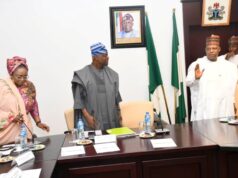(The following statement was released by the rating agency) LONDON, FEBRUARY 22, 2017 – (Fitch) Measures announced on 20 February by the Central Bank of Nigeria (CBN) may ease some of the severe foreign currency liquidity pressure faced by the country’s banks, Fitch Ratings says. The most important aspect of the CBN’s announcement is a plan to normalise the FX interbank market, in our view.
The intention is to clear the backlog of overdue foreign currency obligations owed by banks to international creditors. These are primarily trade finance obligations owed to correspondent banks.
In addition, the CBN will no longer have a say in how banks on-lend the foreign currency they access from it. Banks previously had to demonstrate that funds were being directed to priority sectors of the economy.
The CBN says that providing foreign currency to the manufacturing sector is still a priority, but with restrictions eased, larger banks with greater access to foreign currency will be free to lend to the smaller banks whose access to international funding is restricted. The CBN has also stated its intention to increase intervention in the FX interbank market to increase supply.
The CBN has also reduced the maximum waiting times for banks to take delivery of foreign currency through its forward sales contracts to 60 days from 180. The first of these forwards was announced yesterday for USD500m, with banks reported to have bought around USD371m in one-month and two-month forwards. This should help banks make more timely payments to creditors, speeding up the flow of currency to importers and helping the economy.
The CBN’s initiatives are an important boost for banks as access to foreign currency liquidity is tight and banks have struggled to meet their foreign currency obligations. Nigeria is highly dependent on imports and Nigerian banks have long provided trade finance facilities to importers.
Currency scarcity and exchange rate weakness have made it harder for importers reliant on naira-denominated cash flows to service US dollar-denominated trade finance lines, forcing some banks to restructure their obligations with international correspondent banks last year. Correspondent creditor banks agreed to maturity extensions and were duly compensated for this.
There has been a steady reduction in overdue trade-related obligations since late 2016, helped by more frequent foreign currency auctions by the CBN, and this week’s announcement should further ease foreign currency flows into the banks.
However, the operating environment for Nigerian banks is still challenged by the oil price shock, slow GDP growth, pressure on the naira, scarce access to foreign currency and policy uncertainty.
The CBN plan will also make it easier for individuals and business customers to meet their foreign currency travel and other personal needs because it will sell foreign currency to banks at a rate not exceeding 20% over the interbank (official) rate for these purposes.
There is a large difference between official (NGN315: USD1) and parallel exchange rates (NGN520: USD1) in Nigeria. Contact: Janine Dow Senior Director, Banks +44 20 3530 1464 Fitch Ratings Limited 30 North Colonnade London E14 5GN Mahin Dissanayake Director, Banks +44 203 530 1618 David Prowse Senior Analyst Fitch Wire +44 20 3530 1250 Media Relations: Elaine Bailey, London, Tel: +44 203 530 1153, Email: elaine.bailey@fitchratings.com.
The above article originally appeared as a post on the Fitch Wire credit market commentary page. The original article can be accessed at www.fitchratings.com. All opinions expressed are those of Fitch Ratings.









